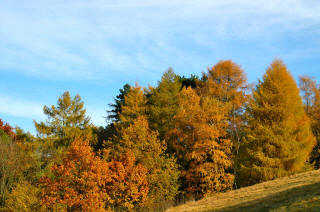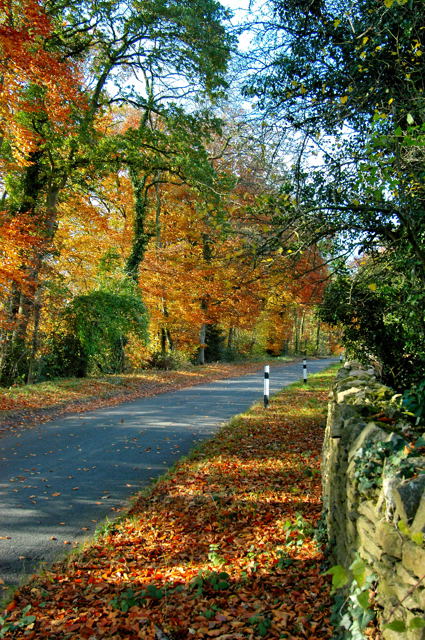Article
Finding Autumn Colour
Locations
This may seem a silly title for an article, as
in autumn in the UK and other countries where the trees drop their leaves, the autumn colours are everywhere. Go to most woodland, town or
city parks, or drive thorough the countryside and tress in autumn colour are
everywhere to be seen. While this is true and many offer opportunities, we are here
going to consider the more photogenic or impressive displays of autumn
colours.
We have produced 4 listings of some of the woodlands
that have displays of autumn colours in
England, Wales,
Wales, Scotland
Scotland
 and
Northern
Ireland, and
Northern
Ireland, but there will be far more. If you are aware of specifically good locations
then please let us know and we can add them to our listings or perhaps put a
location guide together.
but there will be far more. If you are aware of specifically good locations
then please let us know and we can add them to our listings or perhaps put a
location guide together.
The autumn displays that we could search
out to photograph could be:
-
Large displays
-
Bright colours, perhaps specific
colourful species of trees
-
Perhaps tress layered up hillsides
-
Reflections
-
Waterfalls and rivers with colour
-
Trees at different stages
Perhaps some types going faster than others,
or perhaps those at different levels up the hillside, or perhaps the
autumn colours over a waterfall or reflected in a peaceful lake. |

 Click on image to
see larger version Click on image to
see larger version
 |
Each year is likely to be different, some
years all the trees and all of an individual tree goes at once while in
other years its far more gradual. Between locations you can also have
different rates or effects. We have looked at this and why it happens in our
introduction article of autumn
colours.

Finding the autumn displays to photograph
can be undertaken in several ways. You can watch and visit looking for
possibilities or you set out with a vision that you are attempting to
photograph. The first is relatively easy while the second can be far more
difficult and may not be successful, while it can give very special
results.
|

 |
As the autumn progresses, we will expect
and see progression of colours and leaf loss from green through to bare
twigs. Hillsides facing different directions, at different heights, will
often go at different times and speeds, and more isolated tress often before
highly packed ones. This means that we have a wider range of photographic
opportunities than at first may be apparent.
In most areas if we were to go out and
do a recce, looking at the state the trees are in now, we would find a
range of situations, and at the same time spot a number of locations
that would offer photographic opportunities. A few of these may be ideal
today, many more we will feel could be better if we were to come back
again. At first sight it may appear to be completely random, but if you
start to note the locations by the direction they face, how open they
are to that direction and if you are aware of it, the type of trees, you
are likely to see a local pattern forming, with all similar situations
acting in a similar way.
The advantage of this is that while you cannot constantly visit and
check the progress at each location, once you have the local key you can
just check some local areas every few days to get a good idea of when
its worth visiting each location again. While doing your recce, you will spot
locations that you feel could be particularly good, and with each of these it
may be worth creating a quick sketch, and marking the camera positions and
even possibly the lens angles that you feel would work, as well as the time
of day when you feel it would be best to photograph it.
|
See
the article on
how to photograph
autumn colours
 as this may give you more ideas, as well as looking at techniques.
as this may give you more ideas, as well as looking at techniques.
Maps
Ordnance Survey maps show woodland, and
have different symbols for deciduous trees that produce the autumn colours
and the coniferous, fir tress and the like that do not. You can also see
access methods such as footpaths, roads, car parks etc and from the contours, the hillsides.
Lakes are also shown. You can see Ordnance Survey maps online by looking at:
-
Get a map
 a small
area map, that can zoom into the scale where you can see individual field
boundaries. It is draggable, but often quicker to zoom out and back into
another location. You can print the section. a small
area map, that can zoom into the scale where you can see individual field
boundaries. It is draggable, but often quicker to zoom out and back into
another location. You can print the section.
-
Bing
 either
search for a place or take the Many Maps option in the left hand panel and
an
Ordnance Survey map is displayed, you can zoom in further and its fully draggable. either
search for a place or take the Many Maps option in the left hand panel and
an
Ordnance Survey map is displayed, you can zoom in further and its fully draggable.
-
Geograph
 shows
photographs within a grid square. You can search for a place, look at a photo and then using compass pointers move in any direction. You
then see an area page with small versions of photos for each area
under the map section, you can often see what its like at locations, which
even if at different seasons or slightly different angles may give you a
good idea of what is there and if its worth a trip to investigate
further. Town areas may have a lot of photos but in many country areas the
number of images may be small. shows
photographs within a grid square. You can search for a place, look at a photo and then using compass pointers move in any direction. You
then see an area page with small versions of photos for each area
under the map section, you can often see what its like at locations, which
even if at different seasons or slightly different angles may give you a
good idea of what is there and if its worth a trip to investigate
further. Town areas may have a lot of photos but in many country areas the
number of images may be small.
You can also use the
information from our
listings or
location guides on autumn colours
 and put the grid references shown
on these into the above mapping systems to investigate further. and put the grid references shown
on these into the above mapping systems to investigate further.
 Click on images to
see larger versions Click on images to
see larger versions You may also find it worth
looking at other location guides we have in the areas of interest to you. We
haven't attempted to tie all location guides that have trees into the autumn
colours indexes, and some of them may show more opportunities or an idea of
what may be able to be seen. An example of the type of places you may find
interesting are the
Abbey
 sites, and
Historic Houses
sites, and
Historic Houses
 many of these are country locations with trees around, and images
involving stonework and autumn colours could go well
together. many of these are country locations with trees around, and images
involving stonework and autumn colours could go well
together.
We also have an extensive
Gardens section,
 that may also be worth exploring further.
that may also be worth exploring further.
See Also:
Autumn Colours

Autumn colours introduction

Photographing autumn
colours

Filters for autumn colours
 l
l
Finding autumn
colour locations

Autumn Colours in England

Autumn Colours in Wales

Autumn Colours in Scotland

Autumn Colours in Northern Ireland

|